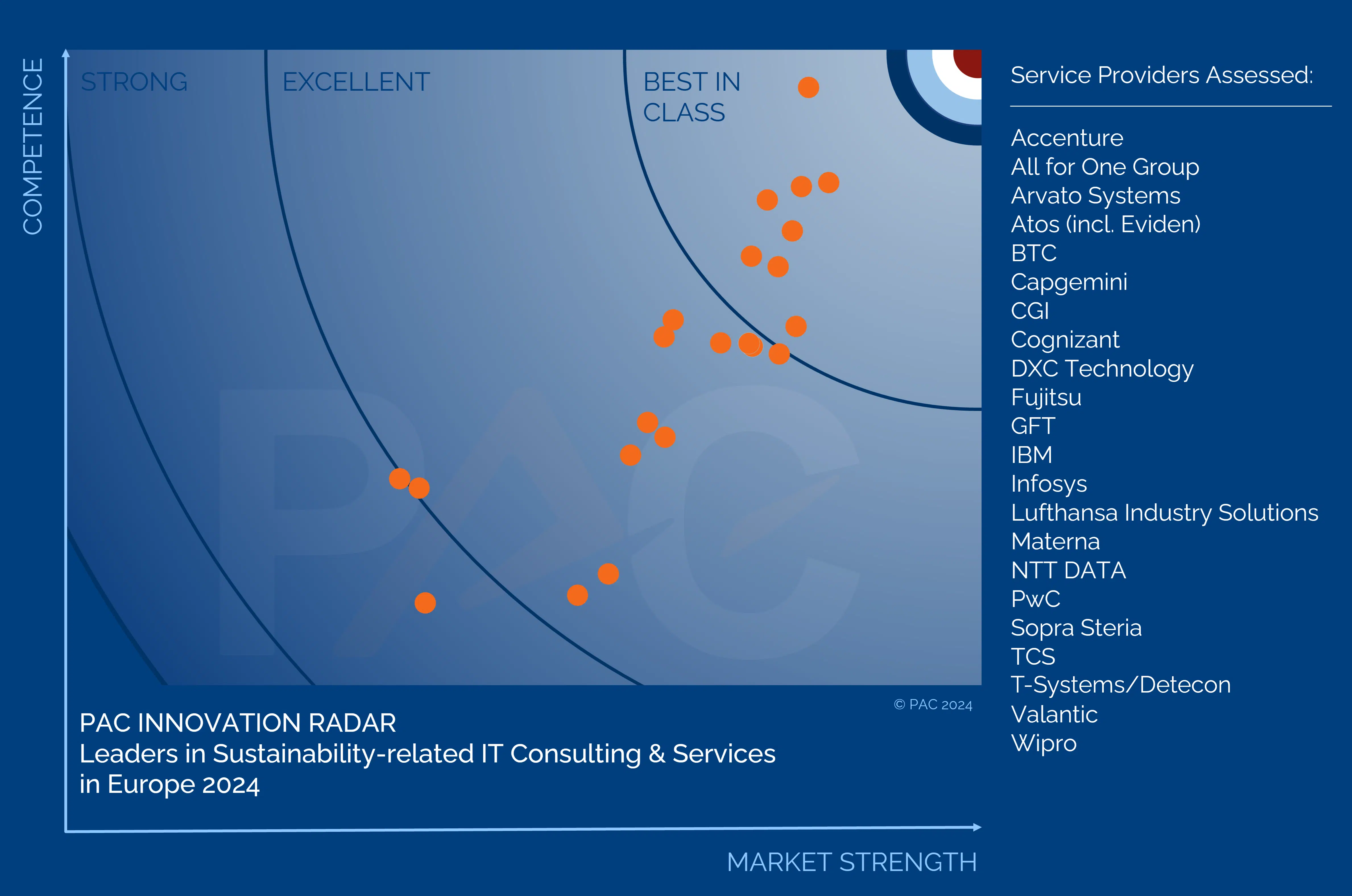Which IT services providers can support their clients with reaching their environmental objectives, and how do they do it?
- Meeting Rising ESG Expectations: ESG regulations such as the Corporate Sustainability Reporting Directive (CSRD) expand reporting obligations and compel businesses to prioritize environmental sustainability.
- Recognizing the Imperative of Addressing Environmental Concerns: IT services providers strategically integrate sustainability into their portfolios, acknowledging the potential to assist clients in reducing carbon emissions through IT transformation.
- Key Insights from PAC RADAR Analysis: The analysis reveals a core focus on applying data-related competencies to ESG data, with many IT providers investing in sustainability-related assets (e.g., tools, methods, etc.). Consulting-led providers play an active role in empowering clients’ organizations through training services, workshops, and change management support to advance sustainability initiatives.
Munich, January 17, 2024: As part of the ubiquitous ESG (environmental, social & governance) regulations and strategies, environmental sustainability is one of the most dynamic topics in the IT services market.
Businesses are under unprecedented pressure to act on environmental issues as expectations from stakeholders such as customers, employees, investors, and regulators continue to rise. European lawmakers are currently revising the sustainability reporting requirements for companies and are planning to significantly extend the transparency obligations. About a year ago, for instance, the Corporate Sustainability Reporting Directive (CSRD) entered into force, replacing the NFRD and significantly expanding the group of companies subject to sustainability reporting requirements in the EU from approximately 12,000 to around 50,000.
Given the diverse range of data sources and possible levers along the value chain of large companies, the complexity to be managed is enormous. As the topic is closely tied to the core competencies of IT services providers, these providers are in a position to offer the right capabilities to support their customers’ net-zero journeys. This makes environmental sustainability one of the most dynamic topics in the IT market. That’s why nearly all leading IT services providers have not only made efforts to address sustainability internally but have also added sustainability to their portfolios as they see great potential for reducing their clients’ carbon emissions through IT transformation.
Against this background, the consulting and analyst firm PAC has had a look at the IT provider landscape in Europe and has assessed the players’ approaches, offerings, strategies, and references in a PAC INNOVATION RADAR series on “Sustainability-related IT Consulting & Services in Europe”.
PAC has analysed the specific strengths and weaknesses of 22 IT services providers based on over 30 predefined criteria. The results are published in nine PAC RADARs that focus on a wide range of customer requirements, providing a quick overview of the positioning of the most relevant providers. Since a local presence can be a decisive factor in selecting a suitable sustainability partner, PAC also provides separate PAC RADARs for France, Germany, and the UK.
Organisations can reach their sustainability goals through the intelligent use of IT (sustainability through IT); at the same time, their own IT must become more sustainable (sustainability of IT). Both aspects are covered by the analysis. Some key findings this year are:
- The topic’s entrenchment among IT providers shows a heterogeneous picture – There are dedicated business units and virtual teams. Typically, sustainability projects are not only staffed with sustainability experts but with mixed teams comprising data scientists, cloud experts, consultants, developers, etc. Interdisciplinary teams are important to drive innovative topics such as sustainability-related IT services and to develop the business in this area.
- Applying data-related competencies to ESG data is a core offering – One of the greatest challenges for companies is to identify, track, and evaluate their own and their suppliers’ carbon footprint. In this context, IT providers are investing heavily in sustainability-related assets (IP, tools, solutions, methods, etc.). In most cases, these are proprietary diagnostic tools to conduct quantitative as-is assessments. Moreover, most vendors have built capabilities around implementing at least one of the major third-party sustainability suites (e.g., Microsoft Cloud for Sustainability, SAP Cloud for Sustainable Enterprises, Salesforce Net Zero Cloud, ServiceNow ESG, IBM Envizi ESG Suite).
- Sustainability empowerment of their clients’ organisations becomes a must for consulting-led IT providers – Most consulting-led IT providers help their clients with training services to empower employees and support change management within the organisation. Many also offer workshops targeted at the clients’ senior management, designed to train CxOs (e.g., Sustainability Officers, Financial Officers, IT and Technology Officers, Data Officers, etc.) to establish a cross-functional task force and align efforts between the departments.
The IT services providers evaluated as part of the PAC INNOVATION RADAR series include global as well as regional players such as NTT DATA, DXC and T-Systems/Detecon.
Customers looking for an IT services partner for the implementation of their sustainability strategy can use the dedicated RADAR tool to weight the criteria evaluated by PAC according to their individual needs. The tool will then recommend the most suitable providers.
Visit www.pac-radar.com for more information about the PAC INNOVATION RADAR “Sustainability-related IT Consulting & Services in Europe 2024”.
